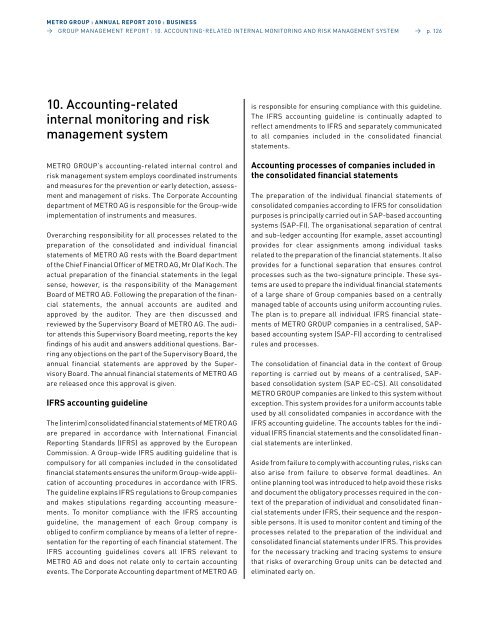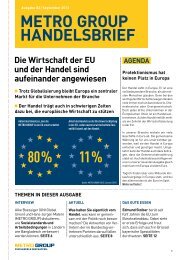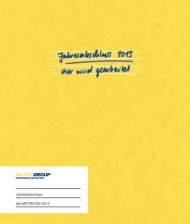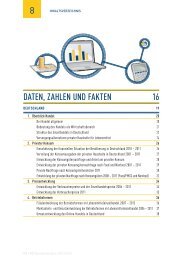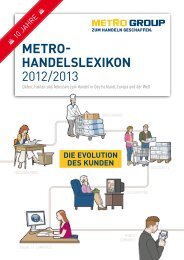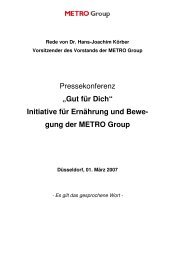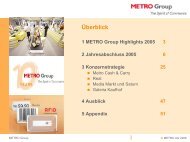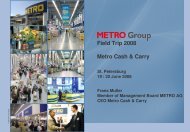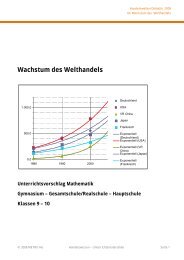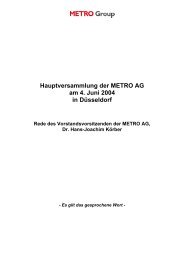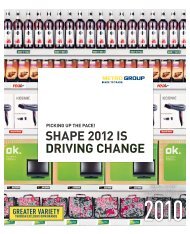pdf (2.5 MB) - METRO Group
pdf (2.5 MB) - METRO Group
pdf (2.5 MB) - METRO Group
You also want an ePaper? Increase the reach of your titles
YUMPU automatically turns print PDFs into web optimized ePapers that Google loves.
<strong>METRO</strong> GROUP : ANNUAL REPORT 2010 : BUSINESS<br />
→ GROUP MANAGEMENT REPORT : 10. ACCOUNTING-RELATEd INTERNAL MONITORING ANd RISK MANAGEMENT SySTEM<br />
10. Accounting-related<br />
internal monitoring and risk<br />
management system<br />
<strong>METRO</strong> GROUP’s accounting-related internal control and<br />
risk management system employs coordinated instruments<br />
and measures for the prevention or early detection, assessment<br />
and management of risks. The Corporate Accounting<br />
department of <strong>METRO</strong> AG is responsible for the <strong>Group</strong>-wide<br />
implementation of instruments and measures.<br />
Overarching responsibility for all processes related to the<br />
preparation of the consolidated and individual financial<br />
statements of <strong>METRO</strong> AG rests with the Board department<br />
of the Chief Financial Officer of <strong>METRO</strong> AG, Mr Olaf Koch. The<br />
actual preparation of the financial statements in the legal<br />
sense, however, is the responsibility of the Management<br />
Board of <strong>METRO</strong> AG. Following the preparation of the financial<br />
statements, the annual accounts are audited and<br />
approved by the auditor. They are then discussed and<br />
reviewed by the Supervisory Board of <strong>METRO</strong> AG. The auditor<br />
attends this Supervisory Board meeting, reports the key<br />
findings of his audit and answers additional questions. Barring<br />
any objections on the part of the Supervisory Board, the<br />
annual financial statements are approved by the Supervisory<br />
Board. The annual financial statements of <strong>METRO</strong> AG<br />
are released once this approval is given.<br />
IFRS accounting guideline<br />
The (interim) consolidated financial statements of <strong>METRO</strong> AG<br />
are prepared in accordance with International Financial<br />
Reporting Standards (IFRS) as approved by the European<br />
Commission. A <strong>Group</strong>-wide IFRS auditing guideline that is<br />
compulsory for all companies included in the consolidated<br />
financial statements ensures the uniform <strong>Group</strong>-wide application<br />
of accounting procedures in accordance with IFRS.<br />
The guideline explains IFRS regulations to <strong>Group</strong> companies<br />
and makes stipulations regarding accounting measurements.<br />
To monitor compliance with the IFRS accounting<br />
guideline, the management of each <strong>Group</strong> company is<br />
obliged to confirm compliance by means of a letter of representation<br />
for the reporting of each financial statement. The<br />
IFRS accounting guidelines covers all IFRS relevant to<br />
<strong>METRO</strong> AG and does not relate only to certain accounting<br />
events. The Corporate Accounting department of <strong>METRO</strong> AG<br />
→ p. 126<br />
is responsible for ensuring compliance with this guideline.<br />
The IFRS accounting guideline is continually adapted to<br />
reflect amendments to IFRS and separately communicated<br />
to all companies included in the consolidated financial<br />
statements.<br />
Accounting processes of companies included in<br />
the consolidated financial statements<br />
The preparation of the individual financial statements of<br />
consolidated companies according to IFRS for consolidation<br />
purposes is principally carried out in SAP-based accounting<br />
systems (SAP-FI). The organisational separation of central<br />
and sub-ledger accounting (for example, asset accounting)<br />
provides for clear assignments among individual tasks<br />
related to the preparation of the financial statements. It also<br />
provides for a functional separation that ensures control<br />
processes such as the two-signature principle. These systems<br />
are used to prepare the individual financial statements<br />
of a large share of <strong>Group</strong> companies based on a centrally<br />
managed table of accounts using uniform accounting rules.<br />
The plan is to prepare all individual IFRS financial statements<br />
of <strong>METRO</strong> GROUP companies in a centralised, SAPbased<br />
accounting system (SAP-FI) according to centralised<br />
rules and processes.<br />
The consolidation of financial data in the context of <strong>Group</strong><br />
reporting is carried out by means of a centralised, SAPbased<br />
consolidation system (SAP EC-CS). All consolidated<br />
<strong>METRO</strong> GROUP companies are linked to this system without<br />
exception. This system provides for a uniform accounts table<br />
used by all consolidated companies in accordance with the<br />
IFRS accounting guideline. The accounts tables for the individual<br />
IFRS financial statements and the consolidated financial<br />
statements are interlinked.<br />
Aside from failure to comply with accounting rules, risks can<br />
also arise from failure to observe formal deadlines. An<br />
online planning tool was introduced to help avoid these risks<br />
and document the obligatory processes required in the context<br />
of the preparation of individual and consolidated financial<br />
statements under IFRS, their sequence and the responsible<br />
persons. It is used to monitor content and timing of the<br />
processes related to the preparation of the individual and<br />
consolidated financial statements under IFRS. This provides<br />
for the necessary tracking and tracing systems to ensure<br />
that risks of overarching <strong>Group</strong> units can be detected and<br />
eliminated early on.


